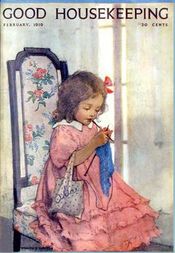 This Thanksgiving, I visited one of my good friends near my school. While on my visit, I saw a cute little magazine cover framed on one of their bookshelves. On the cover, a little girl in a play dress sat knitting what looked to be a scarf. After studying it for a while, realizing how happy the girl seemed, I noticed that it was the cover of an old Good Housekeeping magazine. Now, this cover would not have been printed. People would have claimed that Good Housekeeping supports a limited view of women and their roles as mothers. Good Housekeeping, according to them, would suggest that a good mother is one who teaches her daughter how to be a good mother in the future, or a good mother according to the standards of that day. Her daughter would learn how to knit, sew, wear dresses, and do other chores. Any mother who fails to do this, fails in being a good mother. The way our society would react to this cover if it were published today shows a drastic change in our definition of motherhood. To fail to recognize that knitting and sewing are perfectly fine activities for a woman, if she so chooses, is one of the ways we can see this drastic change. Good mothers put their children first. They show them interesting things, and teach them how to behave well. This cover shows that a good mother teaches her children things, including knitting. It demonstrates that good mothers, in teaching their children these things, show them that they can create things and find happiness in their abilities to create. It doesn’t limit women to specific household chores. It merely shows that women, as people, can and should create things. I remember learning how to knit from my mother. I was excited to be able to make scarves and other neat things just through using two needles and yarn. This sparked my interest in other areas of crafting. But I wasn’t the only one in my family knitting. My brothers did as well. We loved creating things for my family members. We made scarves for practically everyone in the family for Christmas. After learning how to knit, my siblings and I learned how to sew. We created neat couch pillows, with embroidered designs. Whenever we finished a project, we gave it to someone we loved, happy that we could simply create something and give it as a gift. My mother, as all good mothers, showed us how to create things and find joy through our abilities. She helped keep us creative when we could have been bored watching some unintelligent TV shows, or stuck with an iPad, just following instructions and not really thinking. Through showing us how to knit, sew, and do other crafts, my mother sacrificed her time. Instead of having us sit in front of the TV to let her do the things she wanted to do, she would talk to us and teach us things. She devoted her time to our development and thus our confidence. Now, many of the Good Housekeeping covers are centered on the mother herself instead of children. The juxtaposition of just the covers of this magazine demonstrates our culture’s drastic change. When motherhood used to be focused on children, it is now focused on the mother and her ability to host other adult guests. It shows that as a culture we are much more focused on ourselves and our pleasures instead of sacrificing for others. And, it shows that we are much less concerned on children and their development in general. We seem to just let other things teach our children, such as educational TV shows or iPads, so that we can have more time ourselves. This is a loss. Why couldn’t this old magazine cover be a cover today? Would teaching your child how to knit today restrict them from seeking things other than knitting in the future? Does it teach little girls that her place is only in the house? Of course not. It engages children and helps them feel accomplished from creating something. As opposed to just placing children in front of the TV, or handing them iPads to do activities which require them to do things, instead of the more engaging activity of creation, mothers teach their children important skills.
0 Comments
 After the election, students at Cornell University organized a “cry in.” Much like the community students have sought through “safe spaces,” these students want to feel that they are not alone in their misery. They gathered to mourn the recent election of Donald Trump and console each other in their coming fear of a man who, they claim, is a bigot, sexist, misogynist, homophobe, xenophobe, and racist, among doubtless more personal attacks. Professors at other Universities have condoned similar behavior, cancelling tests throughout the week to accommodate the emotional “shock” of their students. People have fled to Facebook to voice their pain, writing that they will be “allies” to women, blacks, members of the LGBTQ community, and so forth. They claim that those who voted for Trump reflect the descriptors they have used for Trump–attacking their morals and character. These people make it seem as though everybody who voted for Trump did so out of hate; because they believe in a kind of white supremacy that demands that they bully people who are different. But that is the way they have seen this whole election. The media has presented Trump as this figure of hate, while the media presented Clinton as the beacon of love. Clinton would be able to support these minority groups and repress the bullying from the privileged. But a vote for Trump would condone it. Why have people become so weak to the point that they feel the need to publicly cry for the outcome of an election? And why has that become acceptable in this nation? Why have there been an increasing amount of “safe spaces” on campuses? It seems like the people who have cried, who have voiced their opinions against Trump and for Hillary, and who have felt the need for safe spaces on campuses do exactly what they claim they oppose. They use the system to accommodate their feelings and insult the people who don’t agree with them. They limit these conversations, which could be made about rational things such as policies and actual facts, down to merely emotional responses. And claim that anyone who disagrees with them is a bully and a horrible person. But, is it really the students’ fault? Many of the universities now have professors who support a progressive, liberal agenda. They reflect the arguments the media has used to demonstrate the weaknesses of those running. But because the media has relied so heavily on the emotional response of the voter, they have focused too much on name calling and mudslinging. So much so that those who claim are rational beings, the university student, is left with little or no means of expressing himself well. They rely on sudden bursts of rage on Facebook, or public displays of sadness through cry-ins, or signs of giving up through “safe spaces” because they think that those who disagree with them will hurt them in person. What happened to the idea of civil discourse? Has this tool, the very one that lets us express ourselves as people through communication and our use of reason, become just something of antiquity? Can we still fight back the animalistic urge to express ourselves in tears instead of reason? I think so. As Edmund Burke puts it, “To read without reflecting is like eating without digesting.” Let us read, then. And reflect. So that we may differentiate fact from opinion–truth from falsehood.  Challenging ourselves is good. Through challenges, we learn important things, such as what we are best at and how we can do things better. We may grow from challenges, thus widening our areas of expertise and becoming more comfortable in pushing ourselves. Through a good challenge, we focus on bettering specific things so that in the future these things may come a bit easier to us. However, sometimes it can be easy to lose sight of the big picture and place our focus on the difficulties of the challenges themselves instead of focusing on our improvements. Through giving ourselves an unrealistic amount of challenges, we may sometimes spread ourselves out too thin and hurt our abilities to succeed. Through challenging ourselves, we force ourselves to evolve. With less time, resources, or better expectations, we now have to find ways to do better than we had before. In forcing ourselves to do more, we naturally gain more experience. In time, this experience will result in knowledge. Whenever I feel uncomfortable doing something new, I try to remind myself that it is sometimes good to be uncomfortable. While doing something I’m not quite good at, but that is good and beneficial for me, I may at first feel uncomfortable. When I went to College, I was at first uncomfortable with living away from home. I didn’t know anyone, didn’t have a car, and wasn’t that great at school. But day by day, I felt more comfortable because I made friends, found ways to get places, and became a better thinker. All of these things are good things that only resulted from me pushing myself out of my house and into something uncomfortable. However, sometimes we get caught up in the challenges we have, and focus just on how difficult they may be, instead of how we will get better from accepting them. We may get lost in our challenges, and forget what we actually had wanted to achieve through them. Through giving ourselves too many challenges, we may start to only do the bare minimum, resulting in understanding only the surface level of deeper things. Recently, I had to limit the amount of times I worked my on campus job at the office. Basketball season had started to pick up, and midterms had hit me hard. I was disillusioned with my standings in some of my classes, and realized that I had to readjust my schedule to give me more time for my studies. Although it was hard to decrease my hours at the office, I realized that it was the best thing for me to do because I had been spreading myself out too thin. I had lost sight of the big picture. Seeing some of my grades really notified me that I was not where I wanted to be in my studies and that I wasn’t focused enough on learning. Instead, I was too distracted by the other uses of my time to put enough time in my studies. Through recognizing our challenges and understanding their goals, we may be able to grow in great ways. However, if we challenge ourselves in too many ways, we may never actually put enough energy into things and get great results. We should, instead, focus on fewer things at one time and get good at them so that we can pile on more challenges later. By becoming experts in our initial challenges, we may use the skills we learned from these and apply them in the future. |
Jessica De GreeJessica teaches 5th grade English and History as well as 11th grade Spanish III at a Great Hearts Academy in Glendale, AZ. In addition to teaching, she coaches JV girls basketball and is a writing tutor for The Classical Historian Online Academy. Jessica recently played basketball professionally in Tarragona, Spain, where she taught English ESL and tutored Classical Historian writing students. In 2018, she received her Bachelor's degree in English and Spanish from Hillsdale College, MI. Archives
April 2020
Categories
All
|
|
SUPPORT
|
RESOURCES
|
|



 RSS Feed
RSS Feed



